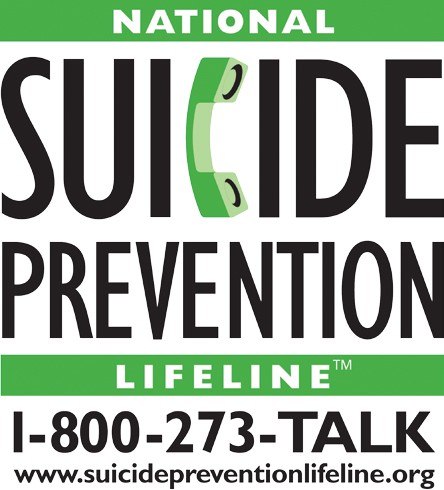Working Through Suicidal Thoughts
Every teen who has suicidal thoughts has a different experience. Some teens’ suicidal thoughts come and go quickly, which is known as “passive suicidal ideation.” Other teens experience constant thoughts of suicide. Their suicidal thoughts include detailed fantasies and involve making plans to end their lives. Experts call this “active suicidal ideation.”
Many teens fall somewhere in between these two extremes. No matter where a teen falls on this spectrum, it’s important for them to get help. When a friend is actively making plans to end their life, it is critical that you step in and tell an adult. If you are troubled by thoughts of suicide, speak up. Asking for help is an act of bravery that will change your life for the better.
KNOW THE WARNING SIGNS
Young people who have attempted suicide exhibit classic warning signs. When people talk about suicide, listen. When a teen starts making comments like he or she soon will not be hurting anymore, people will be sorry when he or she is gone, and everyone would be better off without him or her, these should make you concerned. Some other worrying signs are when your friend starts asking questions about dying, such as whether you think dying hurts. Your friend may indicate that he or she wants the sadness and depression to go away and may want to do something about it. These are cries for help, and they must be heeded.
Some other signs that need immediate response include constantly talking about his or her own death, asking about different ways to kill oneself (learning the amount of a lethal dose of medication, how to get a gun, etc.), and actually saying he or she wants to take their own life.
Your friend may be preoccupied with books and music that have the common theme of suicide or be busy planning his or her own funeral. Obvious signs are when the person starts putting their affairs in order, making his or her final wishes known to friends and family, and giving away personal belongings.
Sometimes people may be influenced by someone close to them who has recently died by suicide. The grief over the loved one may be so overwhelming that they see suicide as the only answer. If you see the signs of depression after an event like this, the person should be persuaded to seek help.
It is always a concern when people appear to be withdrawn, with little interest about things and events around them. There is a reason to worry when someone’s physical well-being starts to impact their day-to-day living, such as disruptive sleeping patterns (either too much or too little sleep), abnormal eating habits, and poor grooming, such as skipping showers or not brushing their hair. Persistent boredom and difficulty concentrating, especially at school, should also be alarms. Frequent physical complaints like stomachaches, headaches, and fatigue, as well as a sudden change in their grades, not completing homework, and losing interest in extracurricular activities may also be signs of depression that should be checked out.
Another serious sign is reckless behavior, like driving fast or taking drugs and not caring if he or she lives or dies. One of the most serious signs of impending suicide is when a person has been depressed for a long time or has already had a suicide attempt, and suddenly he or she cheers up. This could be a sign that he or she has made a decision to try to die.
HELPING SOMEONE IN NEED
When someone is thinking of suicide, try to encourage him or her to talk to a person who is trusted, such as a parent, a guardian, or a teacher. Maybe he or she needs to talk to a guidance counselor, social worker, or someone in the mental health profession. If it would be more comforting, encourage your friend to talk to a spiritual adviser or a member of his or her clergy.
It is important to be a good friend and listen. Try to explore the problem: What has been going on in the past couple of months? What has led up to the current situation? Always take your friend seriously, and do not make jokes about his or her feelings. Be interested in his or her emotions and actions. Remember to remain calm, be nonjudgmental, and offer appropriate options. If you think your friend is at risk, remove anything from his or her vicinity that could cause harm. Be there to offer any help or assistance. If it becomes over your head and the situation is turning into a crisis, tell a trusted adult. Remember, do not be sworn to secrecy. Seek help.
What you shouldn’t do is debate whether suicide is right or wrong. Do not lecture on the value of life, and never dare the person to do it. Don’t say:
• Don’t worry, things will get better, in time.
• It’s not as bad as you think.
• You shouldn’t feel that way.
• Other people have it much worse.
Finally, do not leave a suicidal person alone. Call a responsible member of the family, a crisis hotline, or if necessary, 911.

If you are with someone who is in crisis, call a suicide helpline. If your friend is in immediate danger, call 911.
If someone were to ask you right now, at this present moment, if you were having thoughts of suicide, what would your answer be? If the answer is “maybe” or “yes,” then this is a really difficult time for you. There is no reason to go through this time alone. If talking to your parents is not possible, try confiding in a trusted friend or an adult who knows you. “I think that some of my teachers in high school are the reason I’m here today,” says nineteen-year-old Helene.
You may be starting to feel out of control and start experiencing sadness and signs of depression. You may feel that your life is a mess, lost and confused, that you have no effect on the outcome of your life, that your feelings are a blur, or you may be starting to have suicidal thoughts. When you are feeling suicidal, many times the emotional pain is great, and you can feel isolated in your pain. A lack of adequate coping techniques can contribute to this sense of helplessness and hopelessness.
Identifying Unhealthy Coping Mechanisms
It is important for you to understand that you cannot eliminate stress entirely from your life, but you can learn how to manage it and reduce some of the distress it causes. You may not be able to control things, but you can control your reactions to those things. More positive ways to handle stress are through activities such as talking to someone who cares, exercising, listening to or playing music, and spending time with friends. When stressed, do you find yourself:
• Withdrawing into yourself?
• Resorting to self-abuse? (cutting, scratching until bleeding occurs, pulling out hair, bruising yourself, etc.)
• Resorting to self-destructive behaviors? (i.e., driving too fast)
• Using alcohol?
• Using drugs?
• Engaging in excessive risk-taking?
• Directing anger to either a specific object or a person?
If you are handling stress in a number of these ways, you need to consider getting outside support to learn how to take better care of your emotional well-being. If you are feeling depressed and suicidal, it is very important to talk to someone about what you are feeling. Finding someone to help is an act of wisdom and great courage.
People to Turn To
There are many teens who feel they would be rejected if people found out about their suicidal thoughts. Suicidal teens often hide their true feelings. Many times, the teen feels that he or she has nowhere to go. The pain is unbearable, and the teen sees suicide as their only choice. Here are some places where you can go for help before you take any further negative actions:
• Start at home with a parent or guardian or trend’s parent.
• If that is not working, speak to a guidance counselor, an empathetic teacher, or a coach.
If you have a teacher whom you highly respect, tell him or her about your suicidal thoughts, even though it may be difficult. Take the risk. In most cases asking for help does get you the help you need.
• Make an appointment to see the school social worker, counselor, or psychologist as they are trained in sucide interventions.
• Teen volunteers or peer counselors workng at crisis centers ask questions of other teens using their own experiences and at a teenage level. By taking with them, it could possibly lead you to get counseling.
• Call a crsis hotline. All conversations are confidential. These lines are manned by specially trained people to give you immediate support and can be helpful for you when you are in crisis. The people who work at the hotlines are trained to listen to you. They have discussions with you and learn about your problems and feelings of isolation. You can call back at any time if you feel suicidal or just need a helpful voice on the other end. They have had success in doing these immediate crisis interventions.
You may feel relief that you have started to share your inner thoughts, feelings, and pain with someone who empathizes and will listen to your emotional struggles. If you don’t, don’t give up. If the first person you approach does not provide the support you feel you need, find someone else. Find someone who is comfortable talking about suicide and working with you to prevent the risk of these thoughts leading to suicidal actions. Keep in mind:
• The person you approach may need to refer you on to somewhere else. He or she may be honest with you and feel you need more support than what he or she can provide. He or she may see that you need someone who can prescribe medications to help you with your depression.
• The person will want to keep you safe. you may need to go to the hospital if you are at high risk in order to get the support you need.
• It’s essential that you are honest with the person you are talking to. Lies will just lead to more lies, and you will end up being caught up in them.
No matter the time of day or night, there are always trained professionals just a phone call away. If you need help, don’t hesitate to call one of the following suicide hotlines. However, if you are in critical danger of hurting yourself or are with someone who is going to harm themselves, call 911.
National Suicide Prevention Lifeline
(United States)
1-800-273-8255
National Suicide Prevention Lifeline
en Español (United States)
1-888-628-9454
National Suicide Prevention Lifeline for Individuals with Hearing Impairments (United States)
1-800-799-4889
Canada Suicide Prevention
Service (Canada)
1-833-456-4566
1.866.277.3553 (for Quebec residents)
The Crisis Text Line
Send a text message that says “HOME” to 741741 (the United States) or 686868 (Canada).
The most common method of dealing with suicidal behavior is doing some kind of talk therapy along with medication to help you through the depression. Counseling is a way to ask for help and talk about your problems with a trained therapist. It is objective, and the person cares what happens to you. It is a support to help you learn about yourself and how to cope. People go to counseling for many reasons, like family problems, problems at school, feeling lonely, relationship difficulties, or just coping with the pressures of being a teenager.
Counselors are men and women who have been trained to listen to your concerns and problems and help you find some answers. Counselors can be psychologists, psychiatrists, social workers, guidance counselors, and other trained individuals like nurses and doctors. Counseling is a process to learn about yourself, and it takes time and commitment. There are many types of counselors and treatments. You may need to shop around to find the person that best meshes with your personality.
Counselors try to get you to help yourself go from one stage to another, to lead a life without pain and sadness as the main focus. Private counseling usually takes place once or twice a week for one-hour sessions. You can discuss your emotions and try to come to some answers. If the therapist is a psychiatrist or a doctor who can prescribe medications, drug therapy may be offered, especially if he or she sees that you are feeling very depressed and very anxious. Doctors may recommend antidepressants to treat your depression.
Antidepressant medication is used to correct a chemical imbalance or chemical disruption in a persons brain. A doctor has to write a prescription for the medication. There are many on the market, and the doctor may have you go through a series of trial medications before you find the one that is most appropriate for you. If you have an addiction to alcohol and/or drugs, a treatment facility may be offered as well.
A counselor may assess your risk of being suicidal. When you talk to a counselor, they will try to familiarize themselves with your sources of stress and your coping mechanisms. A counselor will look for any suicidal warning signs that you may be exhibiting, and if he or she determines that you are at risk, the counselor can then offer interventions to support you. All suicide signs are taken very seriously. If you have a suicide plan, be open and share it with your counselor. Also, your counselor needs to know if you have attempted suicide before. With your counselor’s support, you will learn to manage your stress. Your counselor will help monitor you so that you have somewhere to go if you are starting to feel that you are spiraling out of control.
TYPES OF COUNSELING
Cognitive Behavioral Therapy
Many suicidal teens have these three negative views:
1. A negative view of themselves
2. A negative view of the world
3. A negative view of the future or a sense of hopelessness
A cognitive behavioral therapist focuses on your cognition, or how you see your own reality and interpret your world. The therapist helps you get insight into how you are seeing the world. The sessions usually last about twelve weeks, approximately twenty sessions or more. With this therapy, there also needs to be time to build a relationship with the therapist.
Family Therapy
Family counseling is meeting with a counselor and your family to talk about the individual and group dynamics in your family. This is a way to hear what each member in the family is saying and try to create family dynamics that will work for you in a more positive manner. Some of the goals of family therapy are:
• Get you to see your place in the family
• Get you to see the family dynamics and make good changes
• Get your parents to understand the seriousness of the suicidal threat or attempt
• Get the whole family to work together in an appropriate and supportive manner to help you
• Get your family to understand their conflicts and how to solve them among themselves
Family therapy can be important in helping teens, but each member of the family must be willing to participate and work together to make the changes that are needed. Family therapists are trained in understanding family dynamics and can help your family work together.
Group counseling is when you meet in a small group with others who have similar problems as you. It is a way to hear others who may share some of your own feelings. It also allows you an opportunity to offer your own perspective with peers your own age or people who have undergone similar traumas. Group therapy works well with many teens, as it reaffirms their feelings that they are not the only ones who have these inner thoughts. In order for group therapy to be successful, it has to be run by good leaders who can help support the dynamics between the individuals and the full group.

Group therapy is a great way to work through problems with people who understand what you’re feeling.
When a doctor feels that you have a tendency toward depression, medication may be prescribed. Unfortunately, there is no “antisuicide” pill that can be prescribed to make someone all better. There are antidepressant medications to stabilize your mood and relieve your symptoms, and there are other medications to control accompanying anxiety and excessive eating and sleeping. It appears that medication alone is not the sole answer in supporting people who experience suicidal thoughts. You will probably need a combination of medication and talk therapy.
FINDING A THERAPIST
To get a therapist, you usually need a referral. Your family doctor can give you one. There can be a cost for some therapists. However, some therapists have sliding scales (rates that are adjusted based on a patient’s family income), and some are connected to agencies that may help you in your time of crisis. Your parents might also have a drug or health plan that will cover the cost of your treatment. Again, sometimes you may need to shop around to get a therapist you can connect with.
OVERCOMING SUICIDAL THOUGHTS
Many teens who experience suicidal thoughts say that they feel hopeless. They don’t believe their lives will ever feel different, and they don’t think there are solutions to their depression. Remember that feelings are not facts. There are countless resources for teens who are suicidal. Friends, family, and teachers want to help you feel better and see you live a life free of suicidal thoughts. Help is out there. The first step is reaching out.
Dialectical Behavior Therapy (DBT)
Researchers are constantly studying new therapies, medications, and treatments for mental health conditions of all kinds. One reason to stay positive about the future is the progress that scientists and medical professionals are making in treating depression and suicidal thoughts. In the past, experts have noted that it is difficult to treat teens. However, in 2018, a therapy called dialectical behavior therapy (DBT) became the first treatment backed by research for helping teens fight suicidal thoughts and behaviors.
DBT was developed by Dr. Marsha M. Linehan. It is a variation of cognitive behavioral therapy that involves weekly sessions with a therapist and weekly group therapy sessions. DBT is known for giving people the tools to deal with situations that may cause big, emotional responses.
Dr. Linehan created DBT in the late 1980s. She shared her own story of grappling with mental illness for the first time in 2011. Dr. Linehan suffered with a condition called borderline personality disorder in her teens and was hospitalized for treatment at the age of seventeen. Over time, she overcame the urge to harm herself.
Dr. Linehan says that so-called radical acceptance was what changed everything. Radical acceptance became a core part of DBT. The New York Times describes it this way, “two seemingly opposed principles [form] the basis of [DBT]: acceptance of life as it is, not as it is supposed to be; and the need to change, despite that reality and because of it.” In other words, there is power in accepting yourself and your life exactly as it is now. Yet you can accept yourself and your life while still working to make it better, happier, and more fulfilling.



